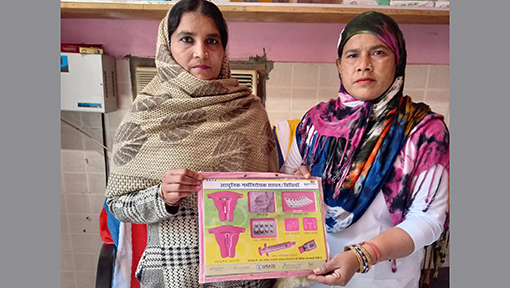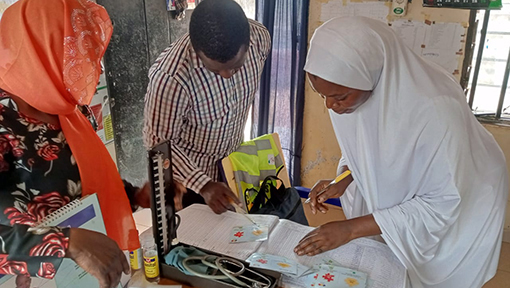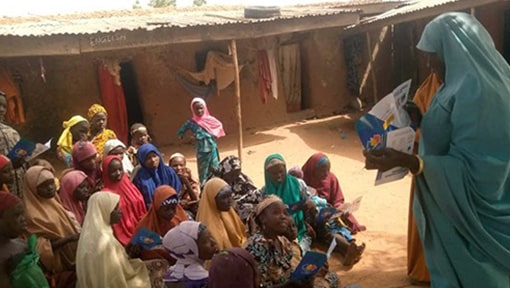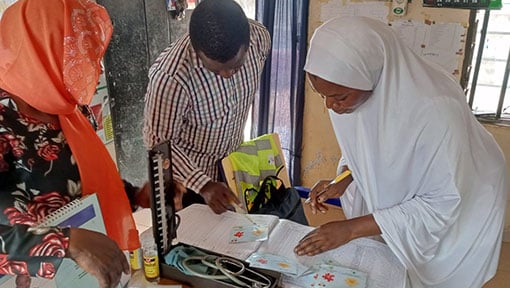TCIHC Urban Tales: Woman Who Oversees Ward in India Champions the Cause of Family Planning
Contributors: Komal Ghai and Parul Saxena
The following story is part of a series from The Challenge Initiative for Healthy Cities (TCIHC) called “Urban Tales,” occasional real-life stories of women and girls benefiting from TCIHC’s work supporting local governments to implement evidence-based family planning and adolescent and youth sexual and reproductive health (AYSRH) solutions.

Mohsina (left) with ASHA Haajra (right) at a UPHC in Muzaffarnagar.
For the last three years, 34-year-old Mohsina has overseen ward number 45 as a ward “corporator” in Muzaffarnagar, a city located in Uttar Pradesh, India. In this role, she ensures that the health, education, housing, transportation and other needs of the ward’s urban population are adequately addressed. Although she holds a position of power politically, she was hesitant and a bit uncomfortable to speak up about women’s reproductive health issues. Until she met an Accredited Social Health Activist (ASHA) named Haajra.
Mohsina was just 19 when she married Mohammad Yakub, who is now a primary school principal in Muzaffarnagar. She has five children and was interested in adopting a family planning method since her last two pregnancies were unplanned but she feared possible side effects from family planning methods. She attended many community meetings in her ward where she heard firsthand about women’s health concerns for themselves and their families. She would encourage women to get their children immunized and counsel them on nutrition, but she was unable to speak to them about family planning. Her encounter with Haajra changed all that.
Mohsina fondly recalls that meeting and what took place afterwards with pride:
In a community meeting, I heard an ASHA educating and counseling women on reproductive health issues. That day, I felt an overpowering urgency to do something about my fears and I called that ASHA to meet me after the event was over. I inquired about all the family planning methods and shared my concerns hesitantly. Haajra [the ASHA] explained in detail how each method works and told me something that changed my perception of contraceptives that ‘side effects are temporary and not life-threatening.’ She gave me the number of the nearest urban primary health center (UPHC) where during fixed day static services (FDS) day, assured and quality FP services were provided. I was impressed with her and learnt that she had received hands-on coaching under the PSI-TCIHC project. I decided to adopt a long-acting reversible family planning method and availed services during an Antral diwas/FDS day organized at the UPHC. I did not have any serious side effect.
After overcoming my fear, I realized there are many women in my ward who are ignorant or have myths and misconceptions associated with contraceptives. I decided to empower women with correct information. With ASHA Haajra I organized group meetings exclusively on family planning in various locations in the ward. I encouraged women to attend group meetings and openly discuss their problems with the ASHA. We also involved Mahila Arogya Samiti members in organizing the meetings to ensure women’s turnout. During these sessions, we talked at length about why family planning is critically important for the health of the child and mother and emphasized limiting the family size and maintaining a gap of at least three years between births. We advised choosing a method of their choice and availing services from the nearest UPHC as there was no longer the need to visit the faraway district women’s hospital.
Whenever I talk about the advantages of family planning in community, I quote my example. I have accompanied many women to UPHCs on Antral diwas, even helped women who are willing to adopt a method by convincing their in-laws/husband.”
It is critical that women not only have access to credible information and good counseling on family planning, but also role models and champions, like Mohsina and ASHA Haajra, in their communities that can help create an enabling environment for the uptake of family planning services.






